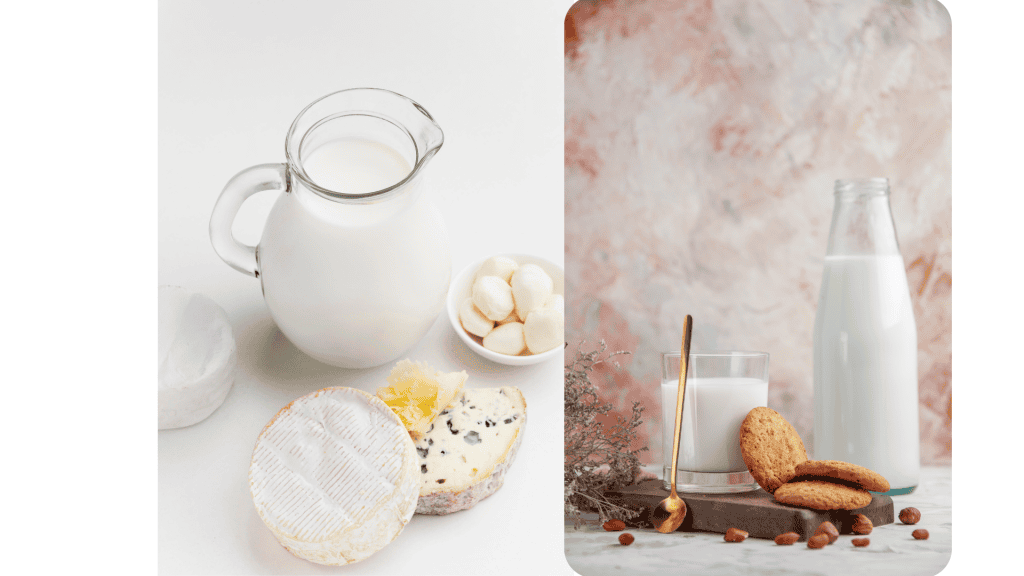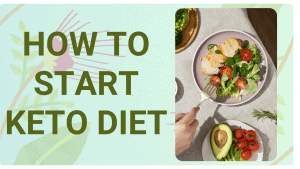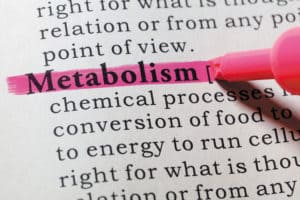Foods to eat on a Keto Diet are high in fat, moderate in protein and very low in carbohydrates, such as meats and poultry like beef, pork, chicken and lamb, along with some seafood such as fatty fish (salmon, mackerel) and shellfish (shrimp, crab). In addition to what foods can I eat on keto diet, eggs are ideal as they are full-fat dairy products like cheese, heavy cream and butter. And healthy fats and oils, including olive oil, coconut oil and MCT oil, are also important. Therefore, this keto diet, also known as the ketogenic diet, is a low-carb, high-fat diet which has become popular because of its positive effects on weight loss and metabolic health.
Mixing low-carb vegetables such as leafy greens, broccoli, and zucchini, along with nuts (almonds, walnuts) and seeds (chia, flaxseed), is a great option for what can I eat on keto diet. In moderation, berries like raspberries and dark chocolate (at least 70% cocoa) can be included as well in your diet. And for the drinks please stick to water, unsweetened coffee and tea, bone broth and dry wine or spirits if you want to go fancy. Hence, avoid high-carb foods like grains, sugars, starchy vegetables, and most fruits, including bread, pasta, rice and potatoes, to maintain a balanced diet while enjoying the food you can eat on a keto diet.
By reading this article, you’ll learn which versatile foods are ideal to include in your keto diet foods list, which ones to avoid, and a few expert tips and answers to frequently asked questions.
Top 15 Foods You Can Eat on Keto Diet
High-fat, low-carb food items are the focus of the keto diet foods list because they encourage your body to enter in the state of ketosis where it burns fat for energy. Exploring what foods can I eat on keto diet further opens up choices such as Greek yogurt and berries in moderation. Below is a list of the top 15 keto diet foods that not only help you lose weight but also improve your overall health. Besides this, you can also Buy Keto Diet Plan for better results.
- Fish and Seafood
- Meat and Poultry
- Eggs
- Full-Fat Dairy Products
- Non-Starchy Vegetables
- Avocados
- Berries
- Nuts and Seeds
- Olive Oil
- Coconut Oil
- Dark Chocolate
- Greek Yogurt
- Cottage Cheese
- Bacon and Sausages
- Butter and Ghee
1. Fish and Seafood
Fish and seafood are low in carbs and high in healthy fats and proteins which are the perfect keto diet foods in your supermarket. For example, salmon has a lot of omega-3 fatty acids, which promote heart health and reduce inflammation. There are roughly 20 grams of protein and 13 grams of fat in a 100-gram meal of salmon, and almost no carbohydrates. Moreover, a study has shown that eating fish on a daily basis can dramatically reduce the risk of heart disease.
2. Meat and Poultry
Meat and poultry are essential parts of a keto diet because of their high protein content and zero carbohydrates like poultry, turkey, pork, and beef. For instance, a 100-gram portion of chicken breast has about 3.6 grams of fat and 31 grams of protein. Additionally, organic and grass-fed options are preferable since they provide more nutrients. Research indicates that grass-fed beef has higher amounts of antioxidants and omega-3 fatty acids compared to grain-fed beef.
3. Eggs
Eggs are a great keto diet foods because they are high in nutrients and adaptable. About 6 grams of protein, 5 grams of fat, and less than 1 gram of carbohydrates are found in one big egg. Additionally, they are a wonderful source of choline, which promotes brain function and studies have linked choline intake to better cognitive function and reduced inflammation.
4. Full-Fat Dairy Products
Dairy products with full fat, such as cheese, butter, and cream, are perfect for a keto diet. They have less carbohydrates and a lot of fat. A 100 grams of cheddar cheese has only 1.3 grams of carbohydrates, 7 grams of protein, and 25 grams of fat. Additionally, dairy products are the essential part of a keto diet foods list while offering calcium and other necessary minerals.
5. Non-Starchy Vegetables
Broccoli, zucchini, and bell peppers are examples of non-starchy vegetables which are fiber-rich, full of vitamins and minerals, and low in carbohydrates. For instance, broccoli has roughly 7 grams of carbohydrates per 100 grams, 2.6 grams of fiber and only 0.4 grams of fat for a healthy digestive system and to help prevent chronic illnesses.
6. Avocados
Avocados are a great source of fiber, potassium, and good fats and a medium sized avocado has approximately 21 grams of fat, 2.7 grams of protein, 12 grams of carbohydrates and 9 grams of fiber in it. Not only are avocados highly filling, but they also aid with electrolyte balance. Studies show that eating avocados can lower inflammation, help manage weight, and enhance cardiovascular health.
7. Berries
Berries including raspberries, blueberries, and strawberries have fewer carbohydrates than other fruits. A 100 grams of raspberries contains approximately 12 grams of carbohydrates, 6.5 grams of fiber, and 0.6 grams of fat. Berries have powerful anti-inflammatory qualities and are great source of vitamins and antioxidants.
8. Nuts and Seeds
Nuts and seeds are low in carbohydrates and high in fat. Almonds, walnuts, chia seeds, and flaxseeds are healthy choices. For example, 28 grams of almonds provide roughly 14 grams of fat, 6 grams of protein, 6 grams of carbohydrates and 3.5 grams of fiber which helps with weight loss and improves metabolic health.
9. Olive Oil
Olive oil is high in monounsaturated fat content, which makes it common in the keto diet plans. There are 14 grams of fat and no carbohydrates in one tablespoon. It also has a ton of anti-inflammatory and antioxidant qualities. Olive oil usage on a regular basis can dramatically lower the risk of heart disease.
10. Coconut Oil
MCTs (medium-chain triglycerides) are high in coconut oil and are rapidly transformed by the body into ketones and there are no carbohydrates in one tablespoon and 14 grams of fat. MCTs can help a person enter ketosis and increase energy. A common query is, “What foods can I eat on keto diet?” Notably, this includes coconut oil and olives. Additionally, your weight loss and metabolic health can be enhanced with coconut oil.
11. Dark Chocolate
One can indulge in dark chocolate in moderation provided that it has a high cocoa percentage (at least 70%) and around 13 grams of carbohydrates, 2 grams of protein, 3 grams of fiber, and roughly 12 grams of fat make up 28 grams serving of 70–85% dark chocolate. Sweet cravings can be fulfilled by this antioxidant-rich food which is better for both heart health and inflammation.
12. Greek Yogurt
Greek yogurt with full fat is a good source of fat and protein, providing roughly 10 grams of protein, 4 grams of fat, and 4 grams of carbohydrates in a 100-gram portion. Probiotics which promote intestinal health, are also abundant in them which improves the immune system and digestive health.
13. Cottage Cheese
Another excellent dairy product in a keto diet foods list is cottage cheese which provides 11 grams of protein, 4.3 grams of fat and 3.4 grams of carbohydrates making up a 100-gram portion. It has a lot of calcium and other important elements. Dairy products help maintain healthy bones and metabolism.
14. Bacon and Sausages
Sausage and bacon are common keto diet foods because of their high protein and fat content which offers 42 grams of fat, 37 grams of protein, and 1.4 grams of carbohydrates included in a 100-gram portion. For a healthy option, go for low-sugar and nitrate-free products. A balanced diet can consist of a decent amount of processed meats if you choose high-quality items.
15. Butter and Ghee
Butter is a great fat source for baking and cooking which contains no carbohydrates and around 11 grams of fat per tablespoon. Clarified butter, or ghee, has a higher smoke point and is lactose-free, which makes it perfect for cooking. Essential fat-soluble vitamins and support for digestive health can be obtained from ghee.
Foods to Avoid During Keto Diet
While there are many items on the keto food list, some should be avoided to maintain the keto diet. These foods are typically high in carbs and can disrupt your progress.
Foods to Avoid:
- Sugary Foods and Beverages: High in carbs, they can spike blood sugar levels, thus stopping ketosis. Moreover, high sugar intake is linked to insulin resistance and weight gain.
- Grains and Starches: Includes bread, pasta, rice, and cereal. Although whole grains and gluten-free options may seem healthy, they are still high in carbs and can prevent ketosis.
- Starchy Vegetables and High-Sugar Fruits: Limit starchy vegetables like potatoes and sweet potatoes. Additionally, high-sugar fruits such as bananas, mangoes, apples, and oranges should be avoided as they can raise blood glucose levels significantly.
- Legumes: Beans, lentils, and chickpeas are high in carbs. While they are nutritious, they can interfere with ketosis due to their high carbohydrate content.
- Root Vegetables: Potatoes, sweet potatoes, and carrots are starchy and high in carbs. Consequently, they can significantly increase your carbohydrate intake.
- Low-Fat or Diet Products: Often high in sugar and carbs to make up for the reduced fat content. Thus, these products can contain hidden sugars.
- Certain Alcoholic Beverages: Beer and sweet mixed drinks are high in carbs and can disrupt ketosis. Furthermore, alcohol can interfere with metabolic processes.
- Sweetened Yogurts: Stick to plain, unsweetened yogurt to avoid added sugars.
- Honey, Syrup, and Sugar: Limit these sweeteners as they are high in carbohydrates and low in nutrients.
- Chips and Crackers: Processed, grain-based snack foods should be minimized.
By carefully selecting your foods, like green tea, you can also reduce some weight. Knowing the Best time to drink green tea is crucial in this, so please watch out for that.
Which Is the Best Food for Keto Diet?
Regarding the keto diet, avocados are among the best foods you can include from the keto diet foods list. Not only are they high in fiber, but they also provide essential elements like potassium and healthy monounsaturated fats. For instance, a medium avocado contains about 21 grams of fat and only 2 grams of carbohydrates. Additionally, you can easily incorporate them into various dishes, such as smoothies and salads. Additionally, adding fatty fish and green veggies will be beneficial. Furthermore, studies have shown that avocados can lower inflammation, control weight, and improve heart health.
At last, you can include these foods in the diet of How to lose 1 kg in 3 days for evident results as well.
Expert Review on What Foods Can I Eat on Keto Diet
According to Dr. Pallabi Behra, a certified nutritionist, the keto diet includes a variety of meals that are high in healthy fats, moderate in protein, and low in carbohydrates. For example, good options include seafood, meat, eggs, dairy products with whole milk, non-starchy veggies, avocados, and some nuts and seeds. On the other hand, carbohydrate-rich foods such as grains, sweet snacks, fruits, legumes, root vegetables and some alcoholic beverages must be avoided. Furthermore, because of their nutritious composition, avocados are very beneficial during the keto diet. By following these guidelines, you can successfully maintain a healthy body and take advantage of the numerous health benefits of the keto diet.
References
Eenfeldt, Andreas, and Bret Scher. 2020. “Keto Diet Foods: What to Eat and Avoid – Diet Doctor.” Diet Doctor. https://www.dietdoctor.com/low-carb/keto/foods.
“Fats and Cholesterol – The Nutrition Source.” n.d. The Nutrition Source. Accessed July 31, 2024. https://nutritionsource.hsph.harvard.edu/what-should-you-eat/fats-and-cholesterol/.
Lopez, Nanette. 2022. “Journal of the Academy of Nutrition and Dietetics.” ScienceDirect. https://www.sciencedirect.com/special-issue/10RJH0RWDFJ.
FAQs
1. What fruit can I eat on keto?
Keto fruits are low in carbohydrates. However, you still need to exercise portion control with most keto-friendly fruits to stay within the limits of a keto diet. Keto-friendly fruits include avocados, watermelon, strawberries, lemons, tomatoes, raspberries, peaches, cantaloupe, star fruit, and blackberries. These fruits have a lower impact on blood sugar levels than others.
2. Is milk allowed on keto?
Milk and related dairy products are essential ingredients in many diets. However, cow’s milk is high in lactose, a type of carbohydrate, so it is unsuitable for a keto diet. Instead, opt for unsweetened almond milk, coconut milk, or other low-carb alternatives. These alternatives can provide similar nutritional benefits without disrupting ketosis.
3. Is cucumber keto?
Cucumbers are 90% water and almost calorie-free. One cup of cucumbers contains only 16 calories and 3 grams of net carbs, making them a great fit for a keto plan. They are hydrating and low in carbs, making them ideal for a keto diet.
4. Can I eat salads on keto?
You can eat a variety of salads on keto, as long as they contain healthy fats and proteins and are low in carbs. Egg salad, grilled chicken salad, shrimp salad, cauliflower salad, arugula salad, cucumber salad, antipasto salad, Greek salad, Caprese salad, and spinach salad are just a few keto-friendly salads. These salads can provide essential nutrients while maintaining ketosis.
5. How many eggs can I eat on keto?
Eating up to 6 eggs a day while on the keto diet is safe. You can consume even more occasionally as long as you ensure you eat your greens, healthy fats, and proteins from other sources. Egg consumption can provide essential nutrients and support satiety.
6. Are carrots keto?
Carrots can be eaten on a keto diet, but in smaller quantities because they’re higher in sugar than leafy greens. One cup of carrots has 12 grams of carbs, 4 of which are fiber. While carrots are nutritious, they should be consumed in moderation to avoid exceeding carb limits.

























